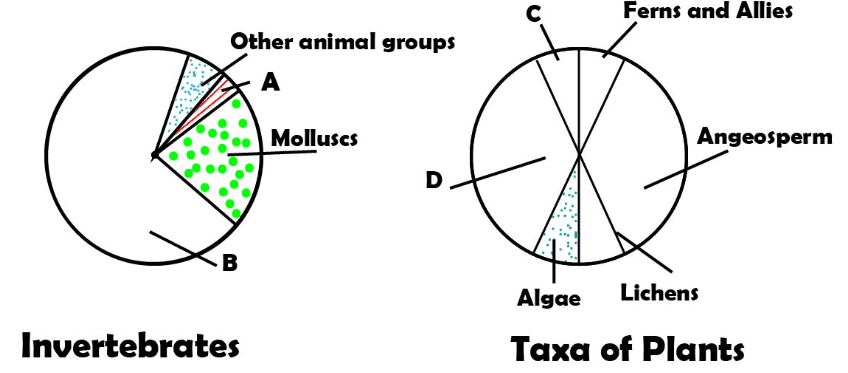Biodiversity and Conservation Class 12 important questions with answers PDF download


FAQs on CBSE Important Questions for Class 12 Biology Biodiversity and Conservation - 2025-26
1. What are the most frequently tested concepts from Biodiversity and Conservation in the Class 12 Biology board exams?
The concepts most commonly tested include biodiversity levels (genetic, species, and ecosystem), hotspots and their significance, threats to biodiversity (such as the Evil Quartet), in situ and ex situ conservation strategies, the significance of sustainable development, and comprehension of the species-area relationship. These topics align closely with current CBSE question patterns for the 2025–26 session.
2. How can understanding biodiversity hotspots help students score better in Class 12 Biology important questions?
Biodiversity hotspots are regions with exceptionally high species richness and endemism, but also face significant habitat loss and extinction risk. Knowledge of Indian hotspots like the Western Ghats and the Eastern Himalayas helps students provide contextually rich answers. Focusing on why these areas are prioritized in conservation policies directly targets board exam expectations, improving marks in both 3-mark and 5-mark questions.
3. What is the 'Evil Quartet' in the context of biodiversity loss, and why is it important for CBSE board exams?
The 'Evil Quartet' refers to four major causes of biodiversity loss:
- Habitat loss and fragmentation
- Over-exploitation
- Alien species invasions
- Co-extinction
4. In CBSE Class 12 Biology, how is the relationship between species richness and area typically examined in board questions?
Students are often asked to explain that species richness increases with area, following a rectangular hyperbola (as per Humboldt’s observation). The regression slope (Z) is significant, showing how new species are encountered with increasing area—higher Z-values at continental scales indicate a faster increase. Clear explanation with examples is expected for full marks.
5. State two conventional methods of ex situ conservation and explain why they are important according to the latest CBSE guidelines.
Two conventional methods of ex situ conservation are:
- Botanical Gardens: Preserve plant species outside natural habitats, support research and reintroduction.
- Zoological Parks: House and breed endangered animals under controlled conditions, aiding in population maintenance and public education.
6. What is the difference between ‘vulnerable’ and ‘endangered’ species as per IUCN Red List categories?
Vulnerable species are likely to become endangered unless causal threats are mitigated, while endangered species are at a very high risk of extinction in the near future. Endangered is one risk tier above vulnerable. Both terms are critical for answering board questions on conservation status.
7. Why is sustainable development considered central to modern biodiversity conservation approaches in CBSE Biology?
Sustainable development ensures that resource use supports present needs without compromising the ability of future generations to maintain healthy ecosystems. Board questions often focus on integrating sustainability with conservation to achieve long-term ecological balance and protect species diversity for future generations.
8. How do in situ and ex situ conservation strategies differ in protecting India’s biodiversity, and which is more effective for board exam answers?
In situ conservation (e.g., national parks, sanctuaries) maintains species in their natural environment, allowing ongoing evolution and ecological interactions—making it most effective for ecosystem-level questions. Ex situ conservation (e.g., zoos, gene banks) rescues species outside their habitat, important for individual species recovery but limited in supporting full ecological processes. For full marks, students should explain the complementary nature of both methods and when each is more effective.
9. What is a common misconception about ex situ conservation, and what is its actual limitation?
A frequent misconception is that ex situ conservation alone can prevent extinction. In reality, while vital for saving highly threatened species, it cannot replicate complex ecological relationships or sustain ecosystem functions, so it must be paired with in situ conservation for effective biodiversity protection.
10. If asked to describe latitudinal gradients in biodiversity for 3-mark board questions, what key points should students include?
Responses should state:
- Species diversity generally decreases from the equator to the poles (latitudinal gradient).
- Tropics have more stable, predictable climates and longer evolution time, promoting speciation.
- Greater solar energy in the tropics leads to higher productivity and more diverse ecosystems.
11. What are the practical exam tips for answering marking-weightage questions from Chapter 13 Biodiversity and Conservation?
To maximize scores:
- Structure answers using bullet points for multi-part questions.
- Use examples from Indian biodiversity (hotspots, threatened species).
- Highlight keywords from the syllabus (e.g., in situ, ex situ, Evil Quartet, species-area relationship).
- Link answers to current environmental issues or CBSE syllabus updates for 2025–26.
12. Why does CBSE place emphasis on the concept of co-extinction in biodiversity loss questions?
Co-extinction explains how the loss of one species can trigger the extinction of dependent species, highlighting the complexity and interdependence of ecosystems. Exam questions require students to understand and apply this concept, especially in the context of food webs or mutualistic relationships (e.g., pollinator loss due to host plant extinction in the Western Ghats).
13. Why is it challenging to accurately measure global biodiversity, particularly for prokaryotes, in board-level answers?
Measuring biodiversity for prokaryotes is challenging because many cannot be cultured in labs, and traditional taxonomic methods are not suitable. Modern molecular biology reveals much more diversity than previously estimated, making exact counts difficult—this point is tested in conceptual and application-based questions.
14. How does mastering board-important questions on biodiversity conservation benefit Class 12 Biology students beyond exams?
Developing strong concepts in Biodiversity and Conservation equips students not only for board marks but also for higher studies, competitive entrance exams, and informed citizenship. Understanding these frameworks aids in environmental awareness and decision-making—skills valued by CBSE and future employers alike.



























